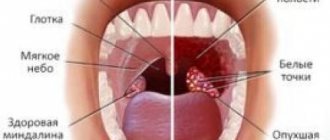Causes of sore throat
The appearance of an unpleasant symptom is most often associated with an upper respiratory tract infection. But this is not the only reason why your throat starts to feel sore.
An unpleasant feeling appears when a person accumulates moral tension. It comes out physically through the constant desire to cough. This is especially noticeable before performances: people first seem to “clear” their throats or take a sip of water. This allows you to stop the tickling and start speaking.
Discomfort in the throat may be associated with thyroid disease. The symptom also occurs in people who inhale chemicals with a burning effect on the mucous membranes for a long time. Most often this is an occupational hazard. Or the mucous membrane is irritated by gastric juice, which is thrown through the esophagus in some gastrointestinal pathologies. There is also a dry paroxysmal cough and a sore throat due to cigarette smoke. Especially if it is inhaled by a person who is not used to it, or if it enters through the nose.
The cause of soreness may be drying out of the oropharyngeal mucosa. It appears when there is difficulty breathing through the nose or excessively dry air (due to heating or working with very hot objects). Perspiration often occurs with increased vocal load - among singers, artists, and public figures.
Types of tracheitis
According to the nature of the course of the disease, they are distinguished:
- acute tracheitis, characterized by the sudden onset of symptoms and resembles a common ARVI, recovery occurs on average in 14 days;
- chronic, occurs without pronounced symptoms, occurs due to undertreatment of the acute form, exacerbations and periods of remission are characteristic.
Chronic tracheitis can be atrophic, when the mucous membrane of the trachea becomes thinner, and the patient suffers from a dry cough, or hypertrophic, in which the cough is wet, and the mucous membrane, on the contrary, thickens.
Depending on the cause, tracheids may be:
- infectious, caused by bacteria, viruses, fungi or mixed pathogenic microflora;
- allergic, caused by exposure to an allergen.
Viral tracheitis occurs due to influenza virus and other viruses that provoke acute respiratory infections entering the respiratory tract. The progression of bacterial tracheitis is associated with the activity of streptococci, Staphylococcus aureus, and Haemophilus influenzae.
Fungal infection of the trachea is rare; the disease is triggered by fungi of the genus Candida, Aspergillus or actinomycetes against a background of reduced immunity.
Mixed tracheitis often occurs when, over time, a bacterial infection joins a viral infection.
Allergic tracheitis develops against the background of increased sensitivity to certain allergens - fluff, animal hair, dust. The disease can be suspected if there is a prolonged cough against the background of hay fever or atopic dermatitis. The main difference is that it appears without a previous acute respiratory viral infection or flu, but as a result of contact with a potential allergen.
Possible diseases
A paroxysmal cough and sore throat appear in many diseases. Main pathologies:
- neurosis - an obsessive desire to cough without signs of diseases of the respiratory system;
- pharyngitis, laryngitis - pathologies of the respiratory system that occur due to viral or bacterial infection;
- allergic reaction - accompanied by lacrimation, nasal discharge, redness of the eyes;
- pathology of the thyroid gland - the growth of the organ creates discomfort in the throat, causing soreness;
- gastroesophageal reflux - failure of the gastric sphincter with the reflux of its contents into the esophagus and tissue irritation;
- nasal polyps, adenoiditis, deviated nasal septum - a person has to breathe more often through the mouth, which causes the mucous membrane to dry out and cause soreness.
The exact cause of the tickling is determined by the doctor based on the results of the examination. To do this, you need to see a therapist.
What to do if the cough is persistent?
How to treat a dry cough and sore throat if they are persistent? In this case, we are not talking about a viral infection, which means that antiviral treatment is not required.
Above, we examined the factors that provoke the development of chronic sore throat and dry cough. Treatment of this kind of cough reflex and sore throat should aim to eliminate the various causes that provoked the chronicity of the process:
- in case of chronic pharyngitis, ARVI, caries, diseases of the nasopharynx, sinuses and auditory canals should be treated in a timely manner;
- avoid exposure to harmful fumes, tobacco smoke and other pollutants on the pharyngeal mucosa;
- no matter how trivial it may be - take care of your health, eat rationally, move actively, spend time in the fresh air, regularly replenish your diet with fortified foods.
Often the question of how to treat a sore throat and dry cough is asked by elderly people suffering from hypertension and constantly taking treatment with antihypertensive pills. Most antihypertensive drugs cause reflex tickling and dry cough in patients, the treatment of which is very difficult. In this case, there is nothing left to do but consult a doctor and, together with him, choose another option for antihypertensive treatment.
Diagnosis of pathology
Making a diagnosis begins with an examination by a therapist, collecting complaints, and taking an anamnesis. After this, a general blood test is prescribed.
If the cause cannot be established, the patient is referred to an otolaryngologist, endocrinologist and allergist, as well as for a consultation with a neurologist. You will need to additionally take a blood test for immunoglobulin E, a throat smear, and an ultrasound of the thyroid gland.
If the cause of the condition is not found, a consultation with a gastroenterologist and esophagogastroduodenoscopy is prescribed. Based on the results obtained, treatment is prescribed.
Principles of treatment
The key to successful treatment is identifying the cause. There are several areas of therapy:
- sedatives - help with neurosis;
- anti-inflammatory drugs - used for infectious diseases;
- antihistamines - effective for allergies;
- antitussives - block cough receptors;
- antibiotics - help against bacterial infections if other remedies are ineffective;
- Cough lozenges - relieve discomfort, moisturize the mucous membrane due to increased secretion of saliva.
If the cause of tickling is chronic poisoning by vapors of volatile substances or tobacco smoke, it is worth minimizing contact with the irritant. This will help get rid of the unpleasant symptom.
Read also: Swelling of the throat
Dear patients! Remember that only a qualified doctor can make an accurate diagnosis, determine the causes and nature of the disease, and prescribe effective treatment. You can make an appointment with our specialists or call a doctor at home by calling 8-(4822)-33-00-33
Be healthy and happy!
Causes and characteristic symptoms
A cough that appears with a sore throat can be triggered by external unfavorable factors and internal ones due to the onset of the disease.
- How to treat a sore throat that is accompanied by a cough?
Physiological dry cough
Occurs under the influence of the following external stimuli:
- street, household, book dust, small metal particles, plant pollen;
- smoke from automobile exhaust gases, factories, thermal power plants, tobacco, stoves;
- aromas of household chemicals: deodorants, perfumes, powders, cleaning products;
- toxic bio- and chemical waste from industrial enterprises;
- excessively dry, hot, cold air indoors and outdoors;
- very bitter (sweet) medicine, medicinal powder.
Such a cough after a sore throat is characterized as transient and short-lived. It is enough just to drink water for the unpleasant phenomena to stop.
Attention! In infants, the physiological cause of a sore throat and dry cough is regurgitation of milk. The eruption of the first teeth is accompanied by an excess of saliva, which the child may choke on. The threat for older children is aspiration of crumbs, small toys, buttons, or other objects. In such cases, you need to monitor the baby carefully: at the first sign of difficulty breathing, immediately call an ambulance!
Causes are pathological
Characteristic dangerous features of disease manifestations:
- With allergies (and asthma), children feel a tickling in the throat, and dry periodic coughing is noted. During an attack, adults convulsively try to breathe, cough exhaustingly, with wheezing to the point of suffocation. Danger is the formation of bronchospasm due to narrowing of the airways due to a large amount of inseparable viscous mucus in the alveoli. Hypoxia may occur. Associated allergy symptoms: shortness of breath, hay fever, urticaria.
- Laryngitis, sore throat, pharyngitis. Characterized by an unproductive barking cough, hoarseness and itching in the throat. Danger: with laryngitis, the inflammatory process provokes swelling of the larynx - laryngospasm, which threatens suffocation due to the closure of the vocal cords. With angina, swelling of the tonsils prevents the penetration of air. The course of tonsillitis can be complicated by bronchospasm due to stagnation of mucus in the lumens of the respiratory tract. Additional symptoms: lump, hyperemia, sore throat, fever, rhinitis, general intoxication of the body.
- The onset of bronchitis is characterized by a sore throat and paroxysmal dry cough. Subsequently, he becomes productive. Lack of treatment will lead to fibrosis of the lung tissue. Associated symptoms: headaches, fever, weakness, shortness of breath, hoarse, hard breathing.
- When you have pneumonia, the cough is protracted and unproductive. Caused by irritation of the neuroreceptors of the respiratory mucosa by interstitial exudate. Threatening complications: pleurisy, development of purulent abscess. Additional symptoms: chills alternating with fever, weakness, increased sweating, fever, shortness of breath, pain in the head and chest.
- Whooping cough. The cough is dry, continuous, paroxysmal, whistling when inhaling after multiple (over 5) shocks. Formed due to the accumulation of viscous mucus caused by inflammation of the respiratory tract. Danger: asphyxia. Additional signs: runny nose, fever, weakness, redness of the face when coughing, nosebleeds.
- With ARVI, influenza, and other viral diseases, swelling of the tissues of the nasopharynx and accumulation of mucus appear, which prevents air from passing freely. The neuroreceptor endings are irritated, which leads to soreness and attacks of dry, spasmodic cough. Complications: penetration of infection into the bronchi, lungs. Associated symptoms: Fever, chills, runny nose, sneezing, weakness, pain in the throat, muscles, head.
- Reflux esophagitis. Dry cough and tickling occur when stomach contents enter the esophagus. It is caused by irritation of the vagal receptors of the esophagus. Danger of disease: acid gradually destroys gastrointestinal tissue. Symptoms: heartburn, belching, regurgitation in children, stomach pain, sour taste in the mouth.
- The initial stage of tuberculosis is characterized by a dry persistent cough and tickling. Its sounds are varied: a metallic tint (bitonal) with bronchoadenitis. Hoarse – with damage to the larynx. Deaf - with infiltration in the lungs. The danger of tuberculosis is the slow decomposition of the body. Symptoms; weakness, weight loss, loss of appetite, pallor, low-grade temperature.
- Oncology of the larynx – cough is dry, hysterical, hoarse, silent, barking, any kind. It all depends on the degree and area of organ damage by metastases. For humans, cancer is a mortal threat, but if treatment is started in a timely manner, the danger recedes. Additional first signs: fatigue, apathy, lethargy, low appetite, periodic temperature fluctuations, minor pain in the larynx, a feeling of a lump that prevents you from swallowing food.
- Heart failure is often signaled by a dry, paroxysmal or short-term cough that occurs during physical effort or at night. Its cause is the blockage of the air passages with mucus, foamy, viscous sputum. The threat is hypoxia. Additional signs: weakness, shortness of breath, swelling of the legs, heart pain, cyanosis of the nails, nasolabial area. Pale or yellowish skin.
- With VSD, a dry reflex psychogenic cough appears when the throat muscles spasm due to hyperventilation syndrome. The patient cannot breathe, he wheezes, he may lose consciousness and die from suffocation if no one is nearby. Symptoms; tachycardia, pallor, sweating, dizziness, nausea. Pain in the head, weakness in the legs, anxiety, fear.
We recommend reading: How to lower the temperature at home - basic methods
It is impossible to determine the cause of a frequently disturbing cough on your own, so in any case you need to go to a doctor to find out the etiology of the disease. Taking simply “Cough cough” pills without a prescription can lead to serious complications.
You can watch an overview of the probable causes of a sore throat in the following video:









